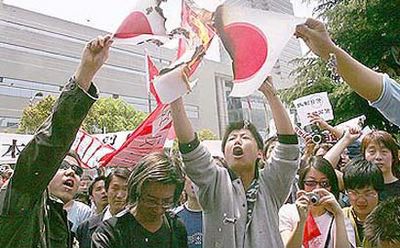China-Japan Demons At Play

Not very angry Chinese protesters. (Reuters)
This is the strangest photo of a demonstration I've ever seen. It was taken at a demonstration in Shanghai yesterday, when 10,000 very nicely dressed people demonstrated against the Japanese, destroying the property of Japanese businesses in the process.
In the photo, only four people appear to be least bit engaged. The others are looking down, taking pictures and generally not looking too angry about anything. It makes me wonder if this was a staged demonstration, peopled by government employees earning overtime.
This morning's LATimes report indicates the strange photo may not be representative of the mood in China. Read the quotes below and you get the sense that people are genuinely angry about Japan's failure to recognize and apologize for the monstrous behavior of the Japanese in China during WWII, when, according to Beijing estimates, 35 million Chinese were killed or wounded by the Japanese. Less emotional but also playing into the demonstrations is the desire of Beijing to keep Japan off the proposed larger UN Security Council.
"This is more than I expected," said Henry Zheng, 23, who said he had flown in from Canada last week to attend the march. Zheng, a business student at a small college near Toronto, said he had come because his grandparents, who live in Shanghai, had told him of their ill will toward the Japanese.Meanwhile in Japan, the Chinese demonstrations are not going over well. The Mainichi newspaper reported that red spray paint had been sprayed on the sign of the Chinese embassy in Tokyo, and more ominously,
Most of the protesters appeared to be students, but many from the streets joined in, some with children. "I want my son to remember this event," said a woman in her 30s who held the hand of her 8-year-old son.
... razor blazes and what appeared to be bullet cartridges were sent to the Chinese Embassy in Tokyo's Minato-ku and the Chinese Consulate General in Osaka, it has been learned.There are some nasty demons being let out here.Embassy officials and others said two envelopes arrived at the embassy on Wednesday. They both contained razor blazes, and contained no indication of the sender. A similar envelope earlier arrived at the consulate general in Osaka.
Officials at the consulate general said they had earlier filed a complaint with police after receiving a white envelope containing what appeared to be bullet cartridges. Inside the envelope was a message in Japanese saying, "If the anti-Japan demonstrations in China proceed, then we'll attack students studying in Japan."
Japan is in a tricky position. It wants that Security Council seat -- but if the cost is admitting its barbaric behavior during the war, the cost would be too high. There are many in Japan who would work to bring down any government that would make such an admission. And compounding the matter is the fact that Japan's very nuanced ways of speech would likely result in an apology that only angered Japan, and did not appease China.
And meanwhile, in China authorities have to be careful not to let street demonstrations go too far, or risk a Tiananmen II. When a little freedom is allowed in a repressive society, it is likely to grow ... and then be repressed violently. The Communists may be too late already. Witness this report from the LAT, which must be very troubling to the Reds and they buff up their iron fists:
A 27-year-old woman from Sichuan province, who came to study and now works in the city, said the event was her first experience of such a protest. "It shows us that we can use this kind of action to show our feelings," she said, adding that it also expressed views about the Chinese government.Also: How Will Chinese Stop the Riots?
Indeed, some protesters took part precisely for that reason. Some carried small signs that advocated democracy and freedom of assembly.
Such sentiments concern the Chinese government, which supports nationalism but also hand worries about the possibility of mass protests directed at Beijing, such as the one that preceded the 1989 Tiananmen Square massacre in the capital.




<< Home